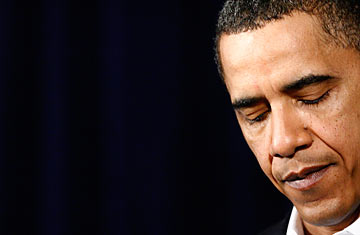
(3 of 6)
But I also think that I have to make sure that our team doesn't lose sight of our broader message. Which is that the American people have a right to see what's going on, understand what's going on. That there are some things you can compromise, but there are some things you shouldn't compromise. If you're dealing with the interest groups here in Washington, don't get too comfortable. That's something you have to constantly reinforce and remind.
What do you mean, "Don't get too comfortable"?
Don't get too comfortable in the sense that there's a culture in this town, which is an insider culture. That's what I think people outside of Washington legitimately can't stand. A sense that they're not being heard. I think we've done actually a pretty good job of working in this town without being completely consumed by it. But from the outside, if you're just watching TV and all you're hearing about is the reports, people may get the false impression that somehow [the insiders] are the folks we're spending more time listening to.
In fact, I spend most of my time listening to the people who — through their letters or through town-hall meetings or in my travels throughout the country — are telling me the stories of hardship and heartache. Losing their house because they don't have health insurance. That's what moves us here, but that's not always what comes across in the day-to-day combat that we're going through.
Well, it seems obvious that when you get through with this bill, you're going to be turning to some of the things that upset people and the perception that you're at one with Wall Street, at one with Big Government. And obviously that means financial reform and also I think budget and infrastructure are going to be big things this year. But let me ask you first about the financial reform part of it. One of your advisers, Paul Volcker, has said that none of the financial instruments that have been developed over the past 20 years have added anything to our economy. And I remember you and I talking during the campaign about how the economy was going to have to change. Do you agree with Volcker?
Well, what I agree with Paul about, and I agree with him on a lot of things, is that sophisticated financial tricks and fancy hedge instruments, etc., aren't valuable just because they're making somebody $100 million worth of bonuses. And I think it is very important that we understand first principles when it comes to our financial sector. The role of the financial sector is to raise capital for businesses that actually make things and provide services to people. To help grow this economy. They should make a profit doing it.
I think the fact that we have a diverse and sophisticated and innovative financial marketplace is a positive. It gives more businesses more tools to raise capital for good ideas, entrepreneurs to start businesses. But when you see more and more of the financial sector basically churning transactions and engaging in reckless speculation and obscuring underlying risks in a way that makes a few people obscene amounts of money but doesn't add value to the economy — and in fact puts the entire economy at enormous risk — then something's got to change.
